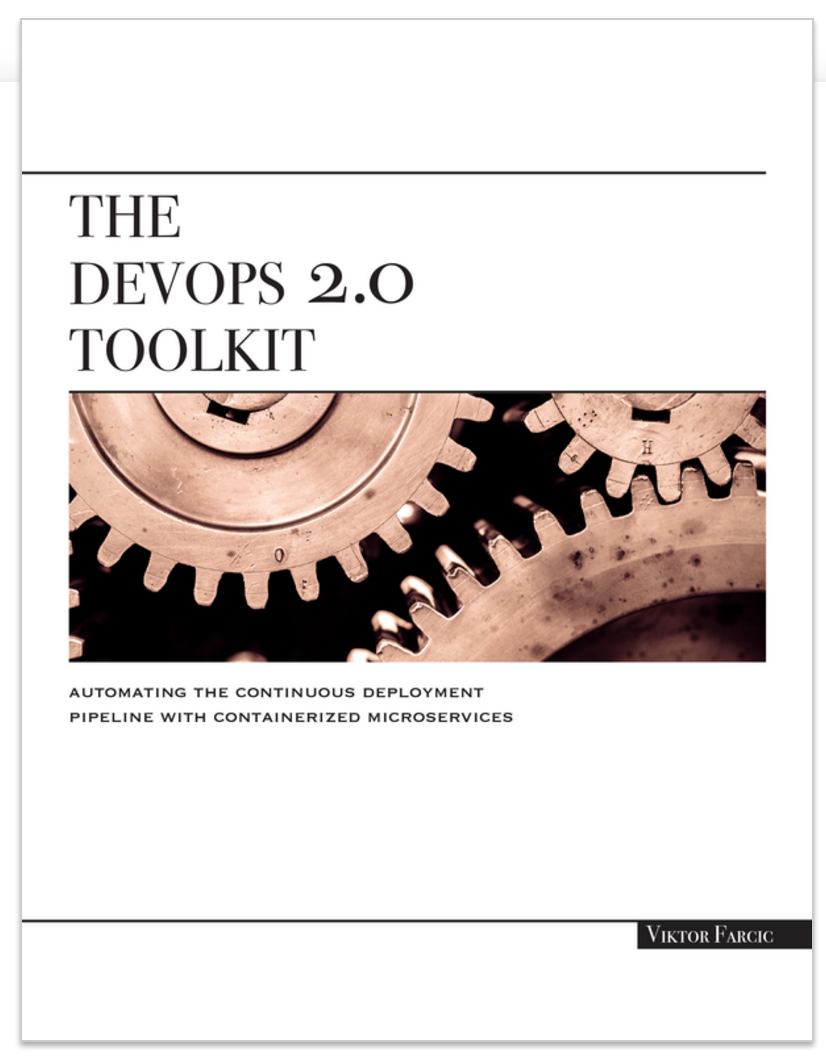Read of the week: The DevOps 20 Toolkit
Next week’s read: The Docker Book: Containerization is the new virtualization
This week I took on a book of considerable size, The DevOps 2.0 Toolkit by Viktor Farcic, a Senior Consultant at CloudBees. A hands-on book that completely skips the chitchat, holds a high pace and goes beyond just the surface of the tools and methodologies covered. In short, this book covers the full process of software development lifecycle, including continuous integration and deployment, logging, health checks and automatic healing. It’s a hands-on book, with detailed steps.

Author style
As he introduces each tool, other options are discussed and compared before choosing one. Automated processes are often first performed manually, explained, and then the reader is walked through setting up that step as an automated step. Each chapter is summarized at the end, and often the environment is pulled down (containers killed) to start from scratch in the next section using the automated steps created in the previous chapters.
He writes in first person and ‘talks’ directly to the reader (you)
Chapters
Preface
Overview
Audience
About the Author
The DevOps Ideal
The Implementation Breakthrough: Continuous Deployment, Microservices, and Containers
System Architecture
Setting Up the Development Environment With Vagrant and Docker
Implementation of the Deployment Pipeline: Initial Stages
Configuration Management in the Docker World
Implementation of the Deployment Pipeline: Intermediate Stages
Service Discovery: The Key to Distributed Services
Proxy Services
Implementation of the Deployment Pipeline: The Late Stages
Automating Implementation of the Deployment Pipeline
Continuous Integration (CI), Delivery and Deployment (CD) Tools
Blue-Green Deployment
Clustering And Scaling Services
Deploying with Docker Swarm Without Links
Scaling Services with Docker Swarm
Scheduling Containers Depending on Reserved CPUs and Memory
Automating Deployment With Docker Swarm and Ansible
Self-Healing Systems
Centralized Logging and Monitoring
Farewell
Appendix A - Docker Flow
Personal review
I loved this book, from start to finish. As one reviewer wrote, ‘it’s for real developers by a real developer’ and I couldn’t agree more.
I have a preference for dense information sort of books that aren’t afraid of covering too many concepts, methodologies, or tools. This book covers A LOT. The book is (at the time of reading it) up to date and includes both old and new trends, old and new tools for comparison and contrast. Instructions seem clear and easy to follow- and I write ‘seems’ as I did not follow along as I’m on a Windows machine, and the setup takes a bit longer.I’ll update this section later. The book is sectioned off and makes it easy to finish a chapter and take a break before moving on to the next one. What I love the most about the book, and why I’ve added it to my ‘highly recommended reads list’ is that I continually learned, with plenty of ‘ahhh’ and ‘ohhhs. I’d get giggly and excited about new tools, ideas, and plans would pop up in my head, and I looked forward to every opportunity I had to continue reading.
The downside would be that some might not like the fast pace, and find it lacking in personal stories (there are a few) and wish it was more narrowly scoped- spread out over several books. The Kindle format (as always with technical books) makes it a bit annoying difficult to read some of the scripts that span over several pages.
For its value, I’d say the book is a bargain, compared to other books it is more than moderately priced. Right now it costs between 35 and 21 USD depending on where you buy it, and format of course.
Other reviews
The book has gotten great reviews, mostly scoring top score.
Where to get it:
As a Kindle format (or paperback) from Amazon. I chose this option but wish I had bought the pdf version instead.
LeanPub – this option is probably most ‘author friendly’: https://leanpub.com/the-devops-2-toolkit
Other
Check out the GitHub repo: https://github.com/Devops2
Description/the numbers
Full title
The DevOps 2.0 Toolkit, Automating the Continuous Deployment Pipeline With Containerized Microservices
Information about the author:
Written by Viktor Farcic, Senior Consultant at CloudBees.
Also author of Test Driven Java Development
Background information about the book
Audience
Developers, architects, managers
Form
Hardcopy, Kindle. I read it in Kindle format on a large phone.
Pages
I believe it’s 430 in PDF format
Keywords
CI, CD, deployment pipeline, microservices, containers, Docker, Ansible, ELK stack, LogStash, Elastic Search, Proxy Services, Service Discovery, Service Management.
I’ll add more keywords later.
Readability (based on the average of 3 pages with no code).
Flesch-Kincaid measures:
Reading ease: 46.6
Grade level: 11*
* Fairly difficult to read, close to college level. For comparison, 9th-grade level is often used for legal documents.
Sentence average length: 16 words*
* Generally 25 is recommended as max
Comments
Last modified on 2016-08-10
